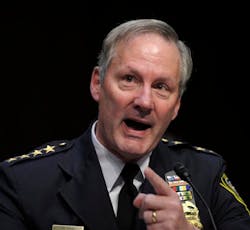Sides No Closer on Guns After Senate Hearing
WASHINGTON, D.C. -- More than two months after the horrific mass shooting at a Connecticut elementary school, the Senate on Wednesday held its second hearing on legislation that would ban assault weapons and high-capacity ammunition clips and extend background checks to gun shows and private sales.
But after hearing heated, emotional testimony, the measure's supporters and opponents seem no closer to agreement on any of the core issues. And given the gridlock in Congress, supporters of new gun legislation may not get everything they want -- and might not get anything at all.
Since the first assault weapons ban became law in 1994, most Republicans, as well as many Democrats, have steered clear of the issue.
A series of recent mass shootings, however, emboldened supporters of gun restrictions to renew their push. For them, the last straw may have been the December shootings at Sandy Hook Elementary School in Newtown, Conn., in which a gunman armed with an assault rifle killed 20 children and six adults.
"We are holding today's hearing because the massacre in Newtown was, sadly, not an anomaly," said Sen. Dianne Feinstein, D-Calif., the lead sponsor of the new bill, as she opening Wednesday's hearing before the Senate Judiciary Committee.
One key witness was Neil Heslin, whose son, Jesse, was among the young Newtown victims. Weeping, Heslin said no family should have to endure what he and the other victims' families have had to go through.
All 21 current co-sponsors of Feinstein's legislation are Democrats, and while some Republicans said they were willing to have a vote on the bill, they've made it clear that they oppose it. Sen. Lindsey Graham, R-S.C., expressed a view shared by the National Rifle Association and many fellow Republicans that existing laws aren't sufficiently enforced.
"I'm a bit frustrated that we'd say one thing, but in the real world we do nothing to enforce laws on the books," he said.
Tempers flared when Graham asked Milwaukee Police Chief Edward Flynn whether police were arresting people who'd failed background checks to buy guns.
"We don't chase paper, we chase armed criminals!" Flynn thundered, generating applause from some members of the audience and a reprimand from Feinstein.
"Sen. Graham and I just got recognized for civility," she said, noting an award that both had received Tuesday. "Let's keep this civil."
Opponents have criticized Feinstein's proposals as feel-good measures that would do little to stop mass shootings but would hurt law-abiding gun owners. During the hearing, the NRA flooded Twitter with responses to the testimony, using the hashtag #StopFeinstein to respond to every point.
"When was the last time you heard anyone who survived a gunfight say they wish they had less rounds of ammo available," one gun control opponent tweeted.
"Criminals already beat the background check system by having straw purchasers buy guns for them," another wrote.
At the hearing, Sen. John Cornyn, R-Texas, said the Justice Department had an abysmal record of prosecuting gun crimes. John Walsh, the U.S. attorney in Denver, said he strongly disagreed. Walsh said Justice Department employees worked many "sleepless nights."
Walsh said that 1 out of 5 cases brought in Colorado involved firearms and his office went after "the worst of the worst," but lacked the resources to prosecute every gun case.
Still, he said that as many as 80,000 people were rejected for gun purchases last year through background checks. "That's a record of success," he said. "We should be proud of that."
Vice President Joe Biden on Wednesday asked a gathering of state attorneys general in Washington for their help in getting the measures through Congress.
"There will be a moral price, as well as a political price, to be paid for inaction," he said.
He hailed the Democratic primary victory Tuesday night of Robin Kelly, a former Illinois state representative who's running for a vacant seat in the U.S. House of Representatives. Her campaign received a $2.2 million donation from New York Mayor Michael Bloomberg, a leading supporter of new gun restrictions, while the NRA backed her chief opponent.
"Voters sent a message last night, not just to the NRA, but to politicians around the country," said the vice president, who's played a leading role in the White House effort to push for gun restrictions in the wake of Newtown.
Bloomberg said after a meeting with Biden at the White House that he was pleased with the efforts the administration was making in trying to urge Congress to act.
"I walked away just thoroughly convinced that he and the president and this whole administration are committed, committed as you can possibly be, to help end the scourge of gun violence," the mayor said.
Earlier, Bloomberg said he'd met with four senators: Republicans Susan Collins of Maine, John McCain of Arizona and Mark Kirk of Illinois, and Democrat Harry Reid of Nevada, the Senate majority leader.
"I did walk away thinking that while none of them made a specific commitment," Bloomberg said, "I walked away comfortable that they understand the issue and that they will be there."
Copyright 2013 McClatchy Washington Bureau

